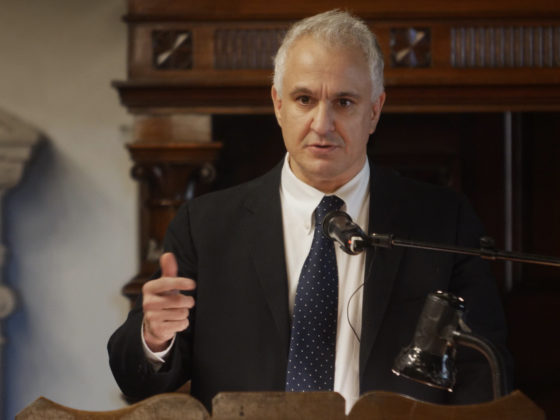You would not think that a public discussion of Shakespeare by two respected academics would devote the entire time to talking about race, gender, sexuality and Donald Trump, would you? Welcome to the sad state of the academic humanities in 2020.
On Monday, March 9, 2020, I attended a discussion at New York’s Joe’s Pub between Columbia University’s James Shapiro and Arizona State University’s Ayanna Thompson on the subject of Shapiro’s not-then-yet-released new book, Shakespeare in a Divided America. The two speakers repeatedly heaped glowing praise upon each other for their virtue, i.e., their progressive stances, and signaled it repeatedly to their audience. Shakespeare, however, did not get much praise or even much attention, at least not in any direct sense. During the discussion, he was variously described by the two speakers as a “tool,” a “vehicle” and a “stick” for beating disfavored political attitudes out of wrong-thinking undergrads. Most of the evening was devoted to the relation of anecdotes about (1) how this or that play was performed or edited at some point in American history in some manner that showed the ostensibly outrageous and backward racial or sexual politics of those associated with the production or edition; and (2) how some audience, whether composed of insufficiently progressive undergrads or just folks in some “backward” part of the country where these professors had spoken, had reacted “backwardly” to some aspect of their presentations. (At one point, in fact, Prof. Thompson went so far as to muster up a full-throated Southern accent to ventriloquize someone she characterized as a “white supremacist” — you know, the kind of white supremacist hick you might often find at talks on Shakespeare — feeling his white pride traduced by something she had said.) And, of course, Trump’s name came up repeatedly, almost as often as Shakespeare’s … because, well, what’s a talk on Shakespeare without a few pot-shots at Donald Trump, right?
The Downtown New York audience was … a Downtown New York audience. The questions audience members asked further confirmed the political virtue of the two presenters and gave everyone involved an opportunity to signal some more. One audience member asked if Shakespeare, like the U.S. Constitution, should be viewed as a “living document” and, thus, revised and scrubbed of some of his more offensive passages. Shockingly, rather than exorcising this demonic questioner and sending her straight back to the pages of Fahrenheit 451 from which she had obviously emerged, Prof. Thompson actually answered her question with a yes, noting that she believed that certain of the most allegedly offensive plays, such as Othello, should no longer be performed at all. Prof. Shapiro did voice some mild disagreement on that score. His approach to such issues, he said, was to go right at these plays’ offensive passages in order to employ them as teaching moments (hence, Shakespeare as a “stick”) useful in purging students of their own racist and sexist beliefs. It did not appear to occur to either of the speakers that for every intolerant left-minded bigot eager to burn, ban and bowdlerize books for the sake of political correctness, there is an intolerant bigot on the other side of the political spectrum eager to burn, ban and bowdlerize books — sometimes the very same books — to excise passages that are perceived as offensive to God, decency and public morals. There is no principled basis on which to enforce one side’s preferred set of repressive and philistine norms without extending an open invitation to the other side to follow suit.
Another audience question asked what Shakespeare play — assuming that Trump would read and could understand Shakespeare — the professors would advise Trump to read in order to educate him. Shapiro simply refused to accept the premise of the question, contending that Trump would never understand Shakespeare. Thompson offered Richard III in order to communicate to Trump the none-too-subtle message that the scheming, murderous villain, in the end, will get what’s coming to him. (Cue the audience applause.)
I have written at length elsewhere that what I saw in the early-to-mid 1990s, when I was an undergrad English major at Yale, as the coming influx of people like this into academia is exactly the reason I chose not to pursue a Ph.D. in English despite my love of reading and interpreting literature. The rising faculty members in the department, I perceived back then, were less interested in literature than they were in aspects of what we now group under the broad label of “identity.” To say it another way, they were less interested in what they were reading than they were in exploring the intersection between what they were reading and contemporary sociopolitical realities, such sociopolitical realities most often being superficial aspects of their own biographies. I did not want any part of this back then. I still don’t. But what was then a trickle is now a tidal wave. While, back in 1984, there was a roughly one to one ratio between liberal and conservative faculty members (39% of faculty were left/liberal and 34% were right/conservative), today that ratio is around six to one, with the ratio of professors who donate to Democrats, as compared to Republicans, being a whopping 95 to one. At top liberal arts colleges, 78.2% of academic departments have either zero Republicans or so few that it makes no difference, with the humanities leading the leftward charge. To say this another way, the academic humanities have become an insular, stagnant and toxic monoculture. There is hardly anyone left to open closed minds, question fixed orthodoxies or challenge bad ideas and, in the process, refine them into good ones.
In his cogently argued 2017 book, The Varieties of Authorial Intention: Literary Theory Beyond the Intentional Fallacy, Claremont-McKenna College’s John Farrell makes the case that coming to terms with the author’s intent is the sine qua non of literary interpretation. Indeed, he contends, it is the sine qua non of understanding any utterance whatsoever. Appropriating an argument made by the philosopher Donald Davidson, Farrell explains that whenever we hear words written or spoken, we immediately set about the work of determining their intent, which requires a trip into the mind and circumstances of the speaker. Sometimes this is so simple that we do it without thinking. I am on the phone with a friend. He says, “Hold on a sec. I’m just going to open the window.” I assume right away that somewhere near him is a window he is going to open. Easy enough. But I might wonder why he is opening it. Is he hot? Or maybe something I just said to him is making him feel a bit hot under the collar. Why is he asking to “hold on a sec” while he does it? Perhaps he needs to use both hands and has to put down the phone or else, again, is something I just said to him prompting him to plead for a breather? If our conversation was perfectly ordinary, however, any such second thoughts along these lines on my part would be legitimately classified as paranoid because they reflect a detour toward my own anxieties rather than circumstances that I could reasonably expect to be on his mind. But now imagine that I know he is currently in his high-rise office building, the kind that doesn’t have windows one can open. Now I’m confused. Now, especially if our conversation actually was getting heated, I really start thinking that he’s just making a lame excuse to give himself a bit of space. I might even muse that his statement may have been motivated by some thought process of which he was unconscious, a welling up of some deep Freudian anxieties mustered up by something I said.
What I cannot do under any circumstances, however, is assume he is talking about a window that is here next to me, in my environment rather than his. That is the kind of conclusion we might expect from an all-about-me toddler who has not yet developed a theory of mind. And yet that is precisely the kind of move so many literary theorists in the 20th and 21st centuries have been making routinely in interpreting — or purporting to interpret — literary works. Under the auspices of deconstruction or reader-response theory, they have devoted themselves to undermining the author’s ostensible intent based on slippage in the meanings of words that could not possibly have been relevant to the author’s own act of composition or gone on extensive fantasias looking through what is, in essence, not the author’s but their own window on the world. Other theorists — under the auspices of Marxist and Marx-inspired or post-colonial theories of literary interpretation — have, instead of searching for authorial intent, taken to passing judgment on works of art based on the failure of authors to live up to our own time’s sociopolitical biases. In place of literary criticism, they have engaged in acts of literary narcissism, using works of art as mere occasions to burrow deeper into their own prejudices. To be sure, in seeking to discern the intent of a literary creator, we can never escape our own prejudices entirely. Interpretation, as the German hermeneuticist Hans-Georg Gadamer has argued, is, at best, a quest to replace the bad prejudices (or mistaken expectations and anticipations) with which we come to a work of art with good or, at least, better prejudices by arriving at a reading that can integrate the parts and the whole. However necessarily imperfect it may be, that process — the process of seeking to replace our bad prejudices about a work of art with better ones by doing our best to achieve a mind-meld with its creator — is one that can yield results that are interesting, mind-opening and even transformative.
Notwithstanding what I witnessed from Prof. Shapiro and Prof. Thompson at Joe’s Pub, as they sought to use Shakespeare as a cudgel to further their political agendas or to use their political agendas as a cudgel to beat up Shakespeare himself, there is an ultimate irony here well worth remarking upon. If Shakespeare were taught the right way, he would be exactly the cure for what ails a divided America. I took my college Shakespeare classes with the recently deceased and larger-than-life superstar professor Harold Bloom. Bloom, a political liberal but intellectual conservative, had no patience for those eager to instrumentalize Shakespeare or those eager to stand in judgment over him. For him, reading Shakespeare was about the endless pursuit of a miraculous meeting of the minds with the single most transcendent literary consciousness our species has ever produced. Bloom’s passion was infectious. When you joined him on his always-upward-sloping journey toward that unscalable Parnassus, you soared above anything merely time-bound and political, to a finer place where no one and nothing was what it seemed, all surfaces were suspect and all notions of black and white, heroism and villainy, perpetually receded behind clouds of ambiguity. Those clouds glowed. Though you could never seem to discern the ultimate source of their radiance, once you laid eyes upon them, you would never forget the sight, would never, even if you wanted to, return fully to the drab earthly realm because even once you descended, you would never look on anything here below the same way again.
The correct answer to that audience member’s question about what Shakespeare play Trump should read is the same as the answer to the question of what Shakespeare play any of us should read. The answer is that it hardly matters. Pick any of the great ones. What matters is how you read. Do not read to extract morals or messages. Do not read to learn anything about yourself, much less to feel comforted or confirmed about who or what you are. Do not read to sit in judgment over the creator any more than a believer reading the Bible would sit in judgment over God. Read simply to understand. Understand as much as you can as deeply as you can. Do that, and the rest will follow. Like all great literature that teaches us to tolerate and even relish ambiguity, Shakespeare elevates us above our petty feuds and political and cultural divisions. He broadens our minds in every possible direction. He lifts us above fear and hatred and even above love and empathy, to the place of pure understanding, the disinterested pleasure of the harmonization of all our faculties in the act of pure contemplation, the realm of beauty itself, in which our ultimate joy will be to muse on that beauty and to share it with as many fellow travelers as we can find. Not everyone will achieve such lofty heights, but this is the destination towards which all great art — and Shakespeare first and foremost — leads us all.
But here is the catch: neither Trump nor anyone else in red-state America will want to read Shakespeare if Shakespeare is unceremoniously yanked from their grasp and deployed as a plodding, moralistic foot soldier in the service of sermonizing left elites. However uncomfortable this may make some people today, Shakespeare belongs and must belong to all of us, the American Christian and the Iranian Muslim, the white man and the black woman, the gay and the straight, the communist and the fascist and everyone in between. What this means is that you, even if you are a respected and accomplished academic, cannot speak cogently about Shakespeare in a divided America unless you can speak about Shakespeare to a divided America. And you cannot speak about Shakespeare to a divided America if your idea of Shakespeare scholarship is to put him on a leash, command him to sit if he protests too much and then sic him, like a feisty lap dog, upon those with whom you happen to disagree.













13 comments
Love these articles. Very well written.
I would go further. Read any great work of literature Gilgamesh, Homer, Dante, even DeSade onwards and you find human nature as it is, not as these tiny maggot minds want it to be. These are people who want to trap us in a box of their making. They don’t want us to explore and lose their control over us. They truly believe they are gods, and we know what the Greeks thought of hubris. I’m sorry to wish ill on people, but the sooner these people are destroyed and their graves covered with salt, the better mankind will be.
The,people who say that “Shakespeare is a living document, and can therefore be changed like the Constitution, to make it what we want today” also say, often, that the Bible “is a living document.” Therefore, they should be asked if they’d also endorse changing the Bible.
They already have it least with the historical review of the gospels. The biblical scholars are questioning the miracles. And no sodom was not destroyed because of sodomy. It was because of xenophobic views
Such a relief to find articles like this. Some days I feel like I’ve woken up in an alternate reality where most academics have lost their marbles. They criticise conspiracy theory followers for their cognitive dissonance, yet they themselves have fallen prey to a conspiracy far more dangerous. Fortunately, my subject, medieval history, has by and large been left alone, although I did come across a bizarre article on the Vikings recently which was entirely fixated on diverse DNA (?!?). Shakespeare is so fascinating because he created truly diverse characters, a full range of human experience, even though in his setting and writing for his audience most people happened to be white. But you could set an Othello or MacBeth in Africa or China and it would still be valid and fascinating. So many academics are now intellectual nincompoops with their pathetic identity politics.
There is, in fact, a MACBETH adaptation set in Africa: https://en.wikipedia.org/wiki/UMabatha
They already have it least with the historical review of the gospels. The biblical scholars are questioning the miracles. And no sodom was not destroyed because of sodomy. It was because of xenophobic views
What about when they ultimate war crime in wokedom is discussed the crusades
Alexander Waugh and other Oxfordians have made a plausible case that the 17th Earl of Oxford, Edward de Vere, was the real author behind Shakespeare and not “Shake-speare” of Stratford. Waugh!s deconstruction of many hidden messages in the works, graves etc. are impossible to be a mere coincidence.
If true, the high priests of Critical Social Justice will definitely ban Shakespeare because it was written by one of the most priviliege men in Europe.
Critical Social Whatever-It-Is might well ban the plays even if they had been written by a barely literate peasant — just as long as the peasant was European.
I might just write a play on the present world we live in. And what a tragedy it would be!
The trouble with the de Vere theory is it supposes the Earl could have somehow managed to be a dramatist with no background in theatre or access to it.
Great article I thought. Many thanks for this.